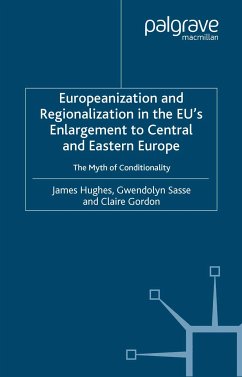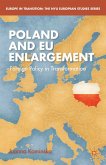This book is a study of EU conditionality and compliance during the enlargement to the Central and Eastern European candidate countries. EU conditionality for membership is widely understood as having been a driving force for Europeanization, providing incentives and sanctions for compliance or non-compliance with EU norms, such as the 'Copenhagen Criteria' and the adoption of the acquis communautaire . By taking regional policy and regionalization as a case study, this book provides a comparative analysis of the effects of conditionality on the Central and East European countries and explores the many paradoxes and weaknesses in the use of EU conditionality over time.
Dieser Download kann aus rechtlichen Gründen nur mit Rechnungsadresse in A, B, BG, CY, CZ, D, DK, EW, E, FIN, F, GR, HR, H, IRL, I, LT, L, LR, M, NL, PL, P, R, S, SLO, SK ausgeliefert werden.









